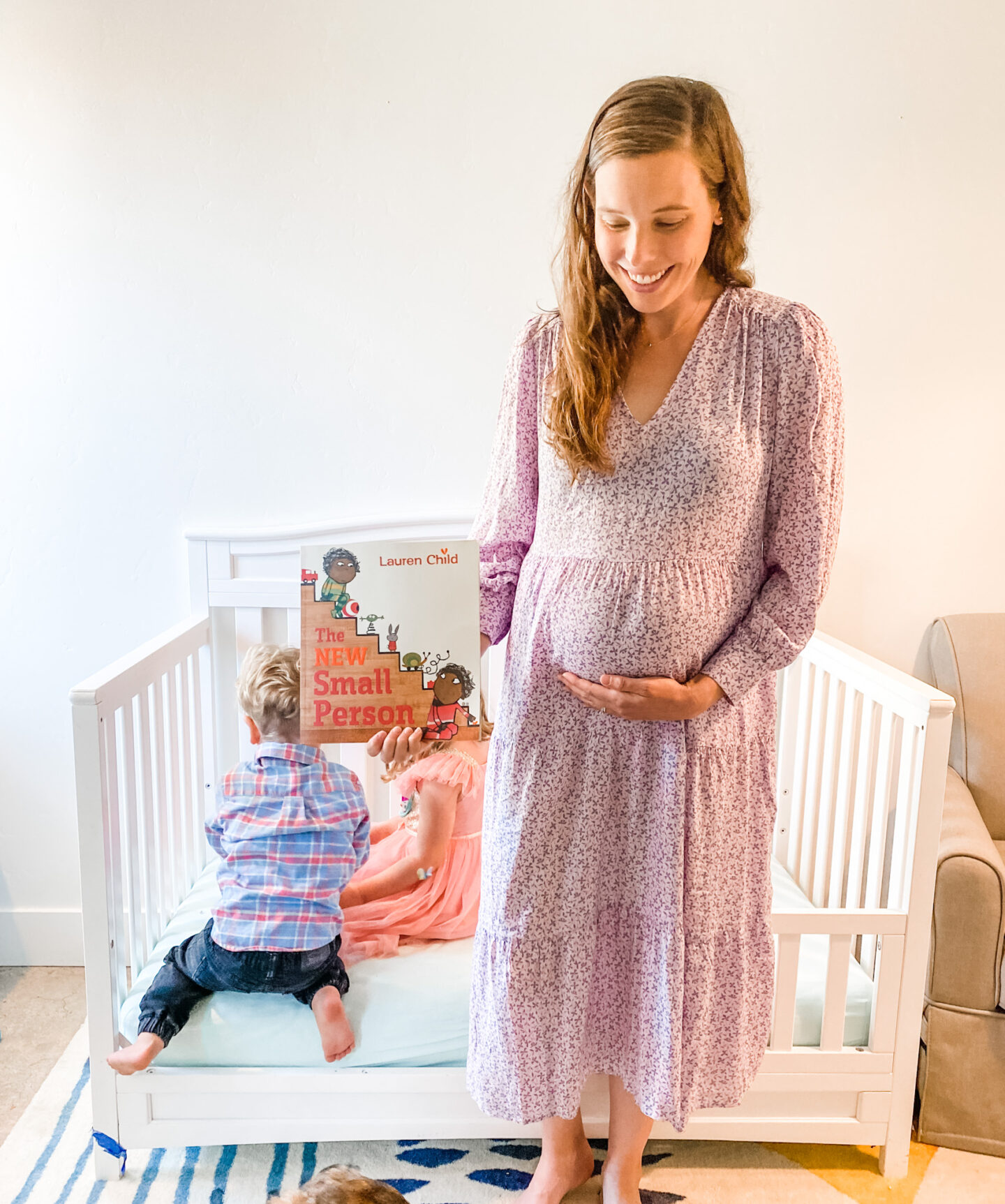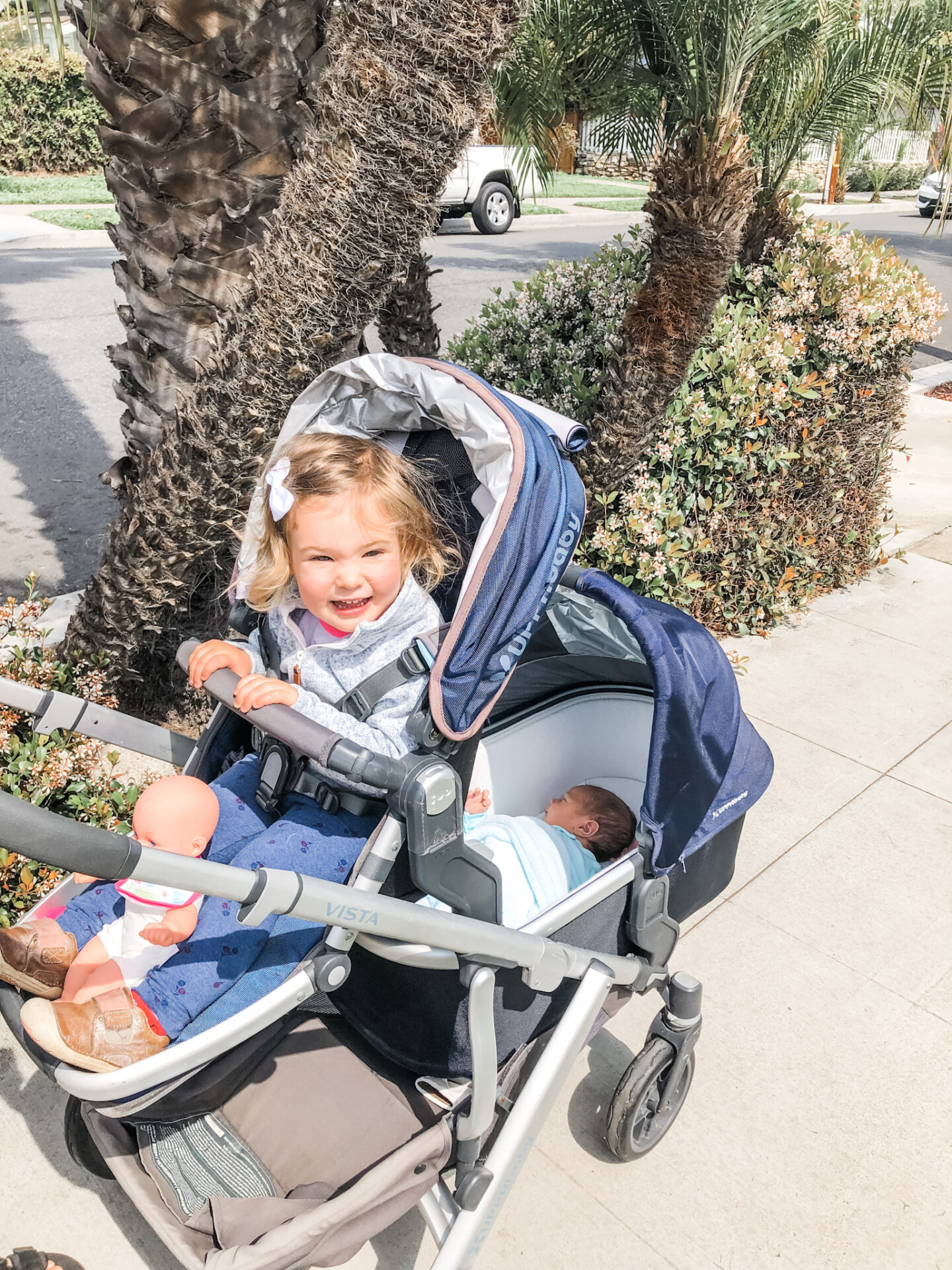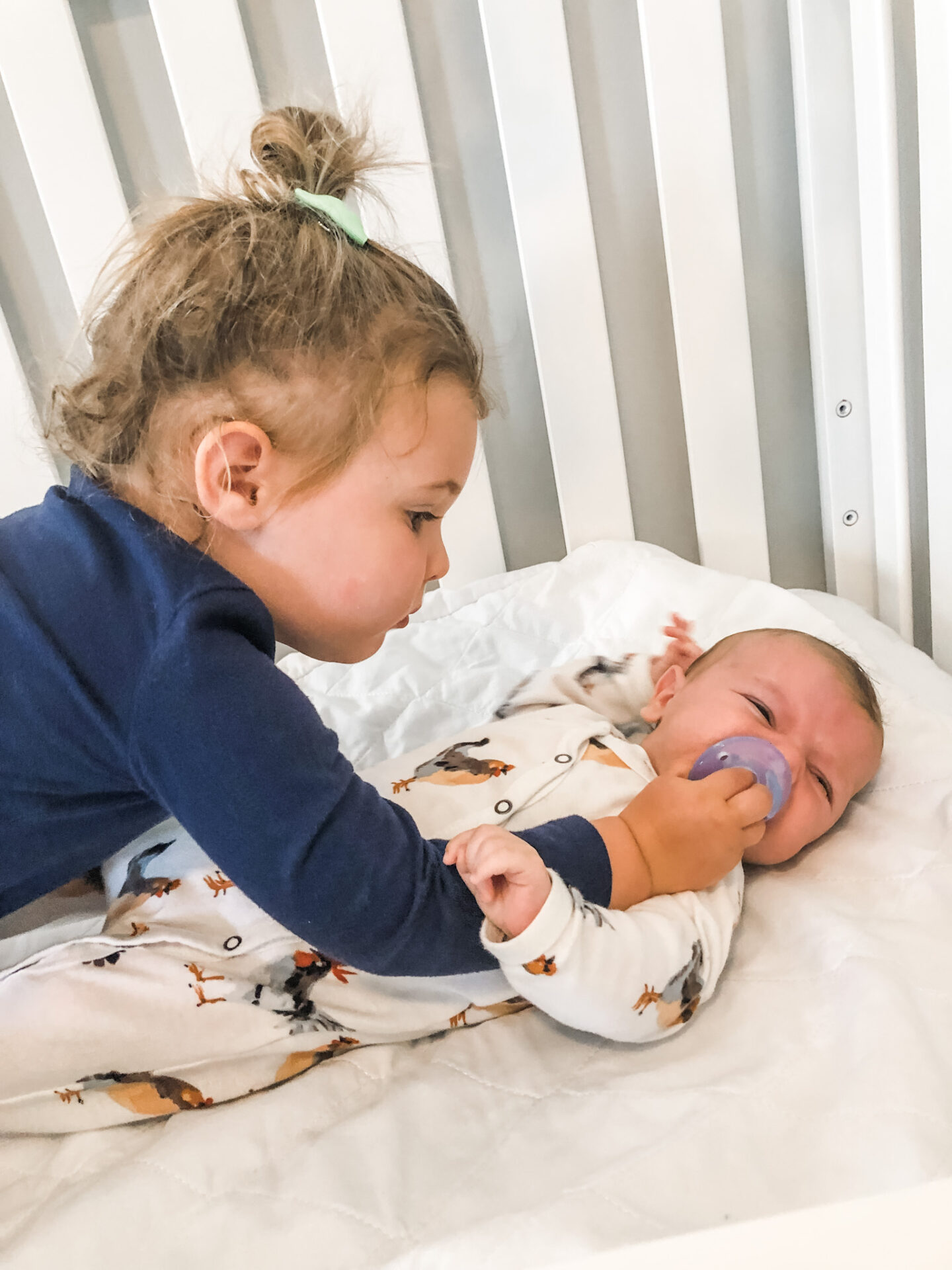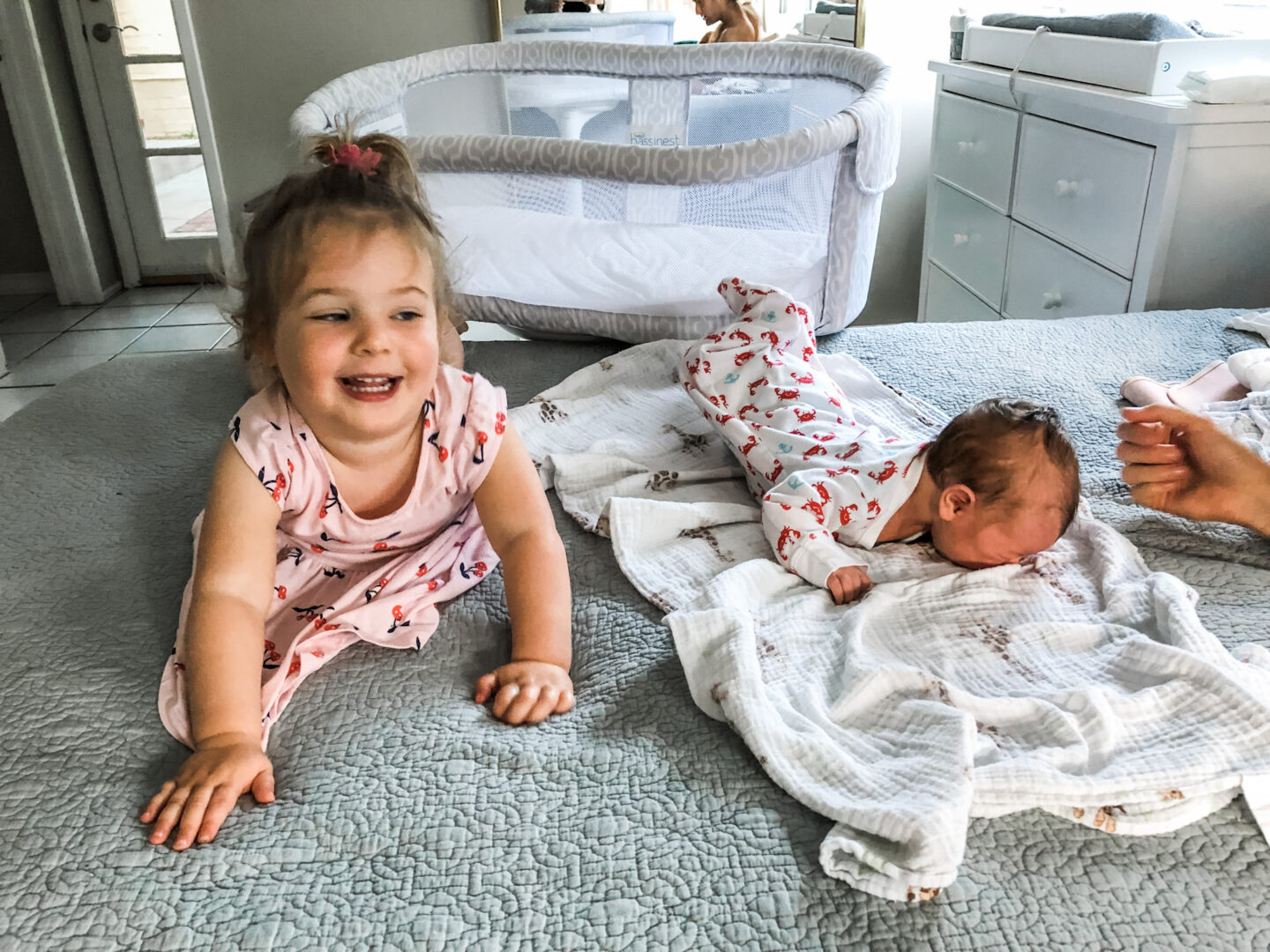Transitioning from 1 to 2 kids is a lot. For you, and for your first. But now that my youngest is 2 years old, I can honestly say that adding another to our family was the best decision we ever made. My kids are two years apart and the best of friends. So much so that we even decided to add a third to the mix! Below, I’ve mapped out all the best advice I received before my second was born, as well as a few things I learned along the way. I hope it’s of use to you during this magical (albeit daunting) time, and don’t forget to enjoy the ride!

- If you can, have your toddler meet a newborn. Or look at pictures and videos of one. When we first told our daughter that a baby brother was on the way, she was thrilled. She was 18 months at the time, and was just beginning to grasp the idea of other kids. As my pregnancy progressed, I noticed that people like grandparents and caregivers would always try to hype her up by asking if she was going to “play with” and “take care of” the baby. While these comments were well-meaning, they were also a little misleading, because, as most people who have ever met a newborn know, they should not be cared for by a two-year-old, nor can they, in any sense of the word, “play.” So, my husband and I made an effort to introduce M to some newborns (this was easy since she was in preschool with a LOT of kids who had new siblings). Thankfully, the more babies she met, and the more we talked about how small, fragile, and sleepy they were, the more she began to realize that her brother would be more of a thing to look at, than a playmate (for the first several months at least). While this was definitely a little disappointing for her, I think it was so much better that she came to this realization early, instead of being disappointed later. And despite being fully aware of the nature of a newborn, M still had to work through some frustrations and resentments when he arrived–but hopefully less than she may have, had she still been expecting us to come home from the hospital with a one year old.

- Acclimate your toddler to other caregivers. Before the birth of my son, my daughter had been in daycare full-time. She had the occasional weekend babysitter, and had been watched, overnight, by her grandparents. Because of this, she had some experience with mom and dad leaving, and always coming back, which is crucial to ensuring that your toddler feels safe when you head off for a day (or several) to give birth. This time around, my son has very little remembered experience being separated from mom and dad for any extended period of time. His daycare closed last March, and he has been home with me ever since. While we would have been more than happy to leave him at home with a babysitter for the weekend, we haven’t really had anywhere to go… So our current plan is to have a sitter come several times in the next few months and at least help him learn to go to sleep with someone else. It’s far from a perfect situation, but better than leaving him to scream for three hours with grandma and grandpa, only to come home the next day and spring a baby on him…
- Start training your toddler for their “big brother” or “big sister” jobs. Toddlers love to be seen as “grown up” and responsible.” And parents love when their toddlers are busy. When my son was born, my daughter knew how to put diapers away, fold kitchen towels, find her brother’s clothes in his drawers, and do a few other simple tasks. While she didn’t necessarily do these things well, they helped solidify her role as “big sister,” and gave her something to do when she was bored, and I was desperate.

- Work out a “toddler-time” schedule with your partner or other caregivers. If your toddler is anything like my first was, they are the center of your universe. Before my son was born, weekends revolved around park playdates and M’s nap schedule. Transitioning from a life all about you, to a life all about baby, can be kind of traumatizing for kids. So, it’s important to make sure you schedule some alone time with your big kid, and allow them daily opportunities to still feel seen and special, despite their new role.
- Be honest about where babies come from. Some people have easy deliveries, and are back to running around the neighborhood by the end of the week. I was not one of these people. After my son was born, my gigantic belly was gone, but I still didn’t feel good. There was also a lot of (TMI warning) blood, and cramping, and sore, leaking boobs–all of which were, at some point or other, visible to my daughter. Even though they’re naturally very self-centered, toddlers are also super observant, and my daughter was, on several occasions, alarmed by the physical changes she noticed in me during the postpartum period. While it might be easier to claim that a stork brought baby brother to the front door in the middle of the night, my personal opinion is that it’s better to tell the truth (without being too graphic), and to explain that all of the “ouchies” that come with having a baby are relatively small, and temporary, and that they’ll all heal with a little time and rest.
- Organize a gift exchange between your toddler and the new baby. Toddlers are suckers for gifts. Encouraging them to pick something out for the new baby will help them practice an important life skill of putting others first, and receiving something from their sibling will start the relationship out on a positive foot. I chose to get my daughter a doll and a mini stroller “from brother,” in hopes that she could use them to “play mama,” when real mama was busy.
- Read all the new baby picture books. My daughter and I spent a lot of time reading books about new babies, and becoming a big sister. I credit many of these books with really helping her wrap her head around what her new role was going to be like. Reading “new baby” books with your toddler will also provide the opportunity for you, as the parent, to ask your child questions about how they’re feeling, or what they’re concerned about. Reading together is also a great way to bond with your toddler, and remind them that, despite the shrinking lap space, you’re still there for them. I have linked several of my favorite books on this topic at the end of the post, so be sure to check that out!
- Make sure that your toddler has his/her own space. Even if your kids will be sharing a room, it’s important for the big kid to have his or her own space. Newborns come with a lot of stuff, and it will help your toddler maintain some sense of normalcy if they have a room, or even just a corner of the playroom, that stays entirely the same even after their sibling arrives. My daughter ended up spending a good amount of “alone time” in her closet after brother arrived, so we just threw a pillow and some stuffies in there and let her do what she needed to do to cope.

- Try not to introduce any other major changes. Unless you live in a sprawling estate, your toddler will most likely hear your newborn wake up in the middle of the night. They will also surely notice that mom and dad are exhausted, that snacks and meals aren’t made as quickly, and that their sibling sure seems to have a lot of needs. These changes are all very difficult for kids to deal with, but it helps if the rest of their lives stay the same. While I definitely do have a friend or two who pulled their older kid out of daycare or preschool when a new sibling was born, and reported that it worked out well for everyone, I had the opposite experience. In the beginning, I thought my daughter would want to be home with mom, dad, grandma and baby, but in the end, going back to her regular routine of school, friends, and teachers seemed to make the transition easier. Now the caveat here is that school (and parks, and gyms, and indoor playgrounds) are breeding grounds for germs. And if you choose to keep up with your toddler’s activities outside of the home, you have to accept the risk that the germs your toddler inevitably brings home will probably make their way to baby. Building the immune system, right?
- Expect regressions. Is your toddler potty trained? Get ready for some accidents. Have they been sleeping through the night for years? welcome to wake-up town. Are they generally well-mannered and polite? Here comes the threenager! Toddlers and young children don’t have a lot of stress-reduction strategies in their toolkit, and because of this, they’re probably going to demand your help in some new, and less-than-desirable ways once baby arrives. Just remember that all of these regressions are temporary (they won’t poop in the closet for their rest of their lives…), and totally normal. I found it best to respond to all the accidents and meltdowns with compassion first, and firm boundaries second.
- Bonus: Have special nursing or feeding-time toys. On the days when I was alone with my newborn and my toddler, the hardest part of the day was nursing time (and yes, that happens like 10 million times a day). There was something about my son being attached to my body that my daughter really didn’t like. Sometimes she would cry, and sometimes she would climb on me, and sometimes she would wreck havoc on the house. So, I took a few special toys (and even added a new one), and put them in a “nursing basket” that only came out of the closet when brother needed to eat. This made nursing time more exciting for my daughter, and even the process of retrieving the basket and putting it away again provided me with a few minutes of relative peace and quiet.
Our nursing-time toys: My daughter’s special nursing time basket (she was about 2 years old at the time) contained this buckle backpack (she loved fastening and unfastening the buckles, as well as filling the backpack with miscelaneous items), an LCD doodle board similar to this one, and this leapfrog laptop. I’m not normally a huge fan of electronic toys, and the laptop can definitely get a little annoying at full volume, but it kept her engaged for feedings, and she definitely learned a thing or two about her letters.
Best Kid’s Books About New Babies and Becoming a Big Sibling











